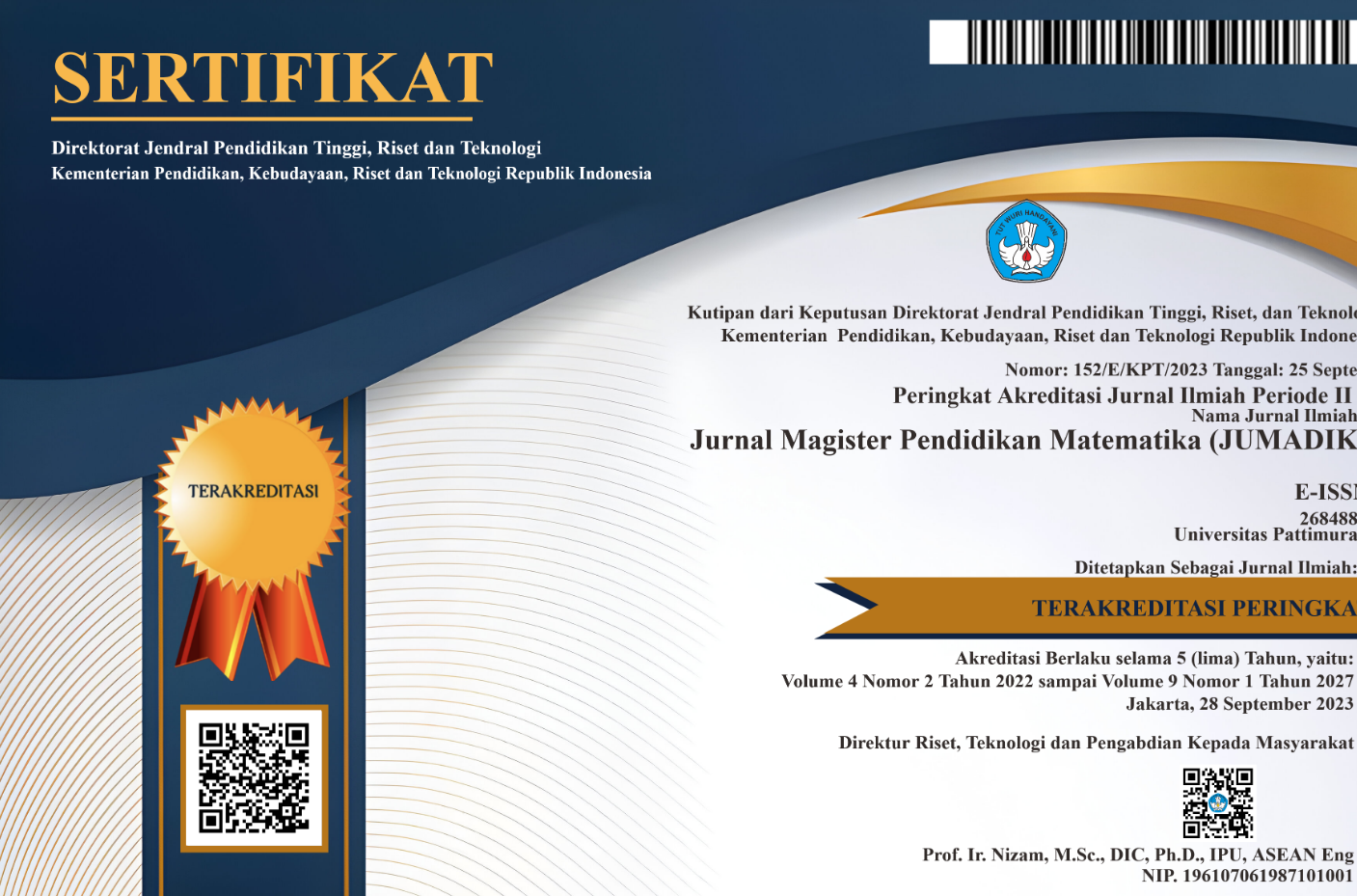THE EFFECT OF STRESS AND ACADEMIC RESILIENCE ON MATHEMATICAL PROBLEM-SOLVING ABILITY WITH LEARNING MOTIVATION AS AN INTERVENING VARIABLE
Abstract
The success of students in solving mathematical problem-solving tasks is influenced by several factors. Charles and Lester explain that the factors influencing mathematical problem-solving abilities are experiential factors, affective factors, and cognitive factors. The main objective of this research is to determine the effect of academic stress on learning motivation, the effect of academic resilience on learning motivation, the effect of academic stress on mathematical problem-solving ability, the effect of academic resilience on mathematical problem-solving ability, the effect of learning motivation on mathematical problem-solving ability, the effect of academic stress on mathematical problem-solving ability through learning motivation, and the effect of academic resilience on mathematical problem-solving ability through learning motivation. The method used is a quantitative approach, with the population consisting of all eighth-grade students at SMP Negeri 2 Lasem. The sample was taken using the simple random sampling technique, and the sample determination was done using the Slovin formula with a minimum sample of 111 students. The instruments used were questionnaires and test questions that had been validated. Data analysis was conducted using the SEM PLS method with the SmartPLS version 4 application. Based on the research results, it can be concluded that there is an influence of academic stress on learning motivation with a p-value of 0.005; there is an influence of academic resilience on learning motivation with a p-value of 0.001; there is no influence of academic stress on mathematical problem-solving ability with a p-value of 0.111; there is an influence of academic resilience on mathematical problem-solving ability with a p-value of 0.000; there is an influence of learning motivation on mathematical problem-solving ability with a p-value of 0.000; there is an influence of academic stress on mathematical problem - Solving ability through learning motivation with a p-value of 0.014; there is an influence of academic resilience on mathematical problems - Solving ability through learning motivation with a p-value of 0.007.
Downloads
References
Afrilia, D., Mustalifah, M., & Ramadanniya, D. N. (2023). Pengaruh Motivasi Belajar Terhadap Kemampuan Pemecahan Masalah Matematis Mahasiswa Tadris Matematika Uin Fatmawati Sukarno Bengkulu. Numeracy, 10(2), 120–133. https://doi.org/10.46244/numeracy.v10i2.2237
Annikmah, I., Priyo Darminto, B., & Budi Darmono, P. (2020). Pengaruh Kepercayaan Diri dan Adversity Quotient terhadap Kemampuan Pemecahan Masalah Matematika Siswa. PYTHAGORAS: Jurnal Program Studi Pendidikan Matematika, 9(2), 112.
Cassidy, S. (2016). The Academic Resilience Scale (ARS-30): A new multidimensional construct measure. Frontiers in Psychology, 7(NOV), 1–11. https://doi.org/10.3389/fpsyg.2016.01787
Chin, W. W. (1998). The partial least squares approach to structural equation modeling. Modern methods for business research. Statistical Strategies for Small Sample Research, January 1998, 295-336. http://books.google.com.sg/books?hl=en&lr=&id=EDZ5AgAAQBAJ&oi=fnd&pg=PA295&dq=chin+1998+PLS&ots=47qB7ro0np&sig=rihQBibvT6S-Lsj1H9txe9dX6Zk#v=onepage&q&f=false
Gadzella, B. M., & Masten, W. G. (2005). An Analysis of The Categories in the Student Life Stress Inventory. American Journal of Psychological Research, 1(1), 1–10.
Handayani, K. (2017). Analisis faktor – faktor yang mempengaruhi kemampuan pemecahan masalah soal cerita matematika. Seminar Nasional Matematika: Peran Alumni MatematikadalamMembangunJejaring, 325–330. http://digilib.unimed.ac.id/id/eprint/26892
Haryono, S. (2016). Metode SEM Untuk Penelitian Manajemen dengan AMOS LISREL Smart PLS. In Jakarta : PT Intermedia Personalia Utama. of Physics A: Mathematical and Theoretical.
Hussein, A. S. (2015). Penelitian Bisnis dan Manajemen Menggunakan Partial Least Squares dengan SmartPLS 3.0. Universitas Brawijaya, 1, 1–19. https://doi.org/10.1023/A:1023202519395
Ibrahim, A. K., Kelly, S. J., Adams, C. E., & Glazebrook, C. (2013). A systematic review of studies of depression prevalence in university students. Journal of psychiatric research, 47(3), 391-400. https://doi.org/10.1016/j.jpsychires.2012.11.015
Jubaedah, A. S. (2022). PENGARUH MODEL PEMBELAJARAN PROBLEM BASED LEARNING TERHADAP KEMAMPUAN PEMECAHAN MASALAH (Studi Kuasi Eksperimen pada Peserta Didik Kelas XI IPS SMA Negeri 2 Singaparna Tahun Ajaran 2021/2022).
Khotimah, K., Budiono, A. N., & Wahyuni. (2022). Hubungan Motivasi Belajar dengan Resiliensi Akademik Siswa. Jurnal Consulenza : Jurnal Bimbingan Konseling Dan Psikologi, 5(2), 180–189. https://doi.org/10.56013/jcbkp.v5i2.1613
Kudsiyah, S. M., Novarina, E., & Lukman, H. S. (2017). Faktor - Faktor yang Mempengaruhi Kemampuan Pemecahan Masalah Matematika Kelas X di SMA Negeri 2 Kota Sukabumi. Seminar Nasional Pendidikan, 110–117.
Kurniawati, A. D., & Siswono, T. Y. E. (2014). Pengaruh kecemasan dan self. MATHEdunesa, 3(2), 36–41.
La’ia, H. T., & Harefa, D. (2021). Hubungan Kemampuan Pemecahan Masalah Matematis dengan Kemampuan Komunikasi Matematik Siswa. Aksara: Jurnal Ilmu Pendidikan Nonformal, 7(2), 463. https://doi.org/10.37905/aksara.7.2.463-474.2021
Lestari, D. E., Amrullah, A., Kurniati, N., & Azmi, S. (2022). Pengaruh Motivasi Belajar Siswa terhadap Kemampuan Pemecahan Masalah Matematika Pada Materi Barisan dan Deret. Jurnal Ilmiah Profesi Pendidikan, 7(3), 1078–1085. https://doi.org/10.29303/jipp.v7i3.719
Mudita, I. K., Santyasa, I. W., & Tegeh, I. M. (2023). Peran Self Efficacy Dalam Memediasi Pengaruh Pembelajaran Daring Terhadap Stres Akademik Mahasiswa. Jurnal Teknologi Pembelajaran Indonesia, 13, 69–79. https://doi.org/10.23887/jurnal_tp.v13i1.2155
Murniati, R. (2022). Pengaruh Stres Akademik Dan Kemampuan Numerik Terhadap Hasil Belajar Siswa Kelas X SMK Negeri Kebonagung. Jurnal Ilmu Pendidikan, 7(2), 809–820.
Nisrina, N. (2020). Pengaruh Minat dan Motivasi Belajar terhadap Kemampuan Pemecahan Masalah Matematik. ALFARISI: Jurnal Pendidikan MIPA, 1(3), 294–303. https://journal.lppmunindra.ac.id/index.php/alfarisi/article/view/8249
Polya, G. (1978). How to Solve It a New Aspect of Mathematical Method Princeton University Press 2004. https://archive.org/details/g.-polya-how-to-solve-it.-a-new-aspect-of-mathematical-method/G. Polya - How to solve it. A new aspect of mathematical method/page/n9/mode/2up
Pradiri, A. P., Hendriani, W., & Surjaningrum, E. R. (2021). Studi Kualitatif dalam Kajian Stres Akademik. INSAN Jurnal Psikologi Dan Kesehatan Mental, 6(2), 79. https://doi.org/10.20473/jpkm.v6i22021.79-89
Pratama, M. R., & Prihatiningsih, D. (2014). Hubungan motivasi akademi dengan tingkat Stres akademi mahasiswa keperawatan semester VI Stikes’Aisyiyah Yogyakarta. Naskah Publikasi STIKES ‘Aisyiyah Yogyakarta, 1–16. https://digilib.unisayogya.ac.id/384/
Puspitasari, E. I., Widyastuti, & Affandi, G. R. (2024). Pengaruh Stres Akademik dan Cognitive Load Terhadap Motivasi Belajar Siswa. 11(September), 374–388.
Rahmawati, D., Fahrudin, A., & Abdillah, R. (2021). Hubungan Kontrol Diri dengan Stres Akademik Akibat Pembelajaran Hybrid dalam Masa Pandemi COVID-19 di SMK X Kota Bekasi. KHIDMAT SOSIAL: Journal of Social Work and Social Services, 2(2), 135–153. https://jurnal.umj.ac.id/index.php/khidmatsosial/article/view/14124
Ramadan, M., & Yushita, A. N. (2022). Pengaruh Stres Akademik, Fasilitas Belajar, Dan Lingkungan Belajar Terhadap Motivasi Belajar Daring Mahasiswa. Jurnal Pendidikan Akuntansi Indonesia, 20(1), 52–66. https://doi.org/10.21831/jpai.v20i1.48530
Robbani, I. A., & Sumartini, T. S. (2023). Kemampuan pemecahan masalah matematis ditinjau dari motivasi belajar siswa sekolah dasar. Jurnal Inovasi Pembelajaran Matematika: PowerMathEdu, 2(2), 185–192. https://doi.org/10.31980/powermathedu.v2i2.3049
Salam, M. N. (2024). Korelasi Motivasi Belajar, Kecerdasan Emosional Dan Peranan Orang Tua Dengan Hasil Belajar Mata Pelajaran Pjok Peserta Didik Kelas Viii Sekolah Menengah Pertama Negeri Se-Kecamatan Sawangan Kabupaten Magelang. 1–203.
Sari Nst, H. M., Syahputra, E., & Mulyono. (2023). Pengaruh Kemampuan Berpikir Kritis, Literasi, Spasial dan Komunikasi Matematis Terhadap Kemampuan Pemecahan Masalah Matematika Siswa SMP Kelas VIII di Medan. Jurnal Cendekia : Jurnal Pendidikan Matematika, 7(1), 820–830. https://doi.org/10.31004/cendekia.v7i1.2234
Sari, P. K. P., & Indrawati, E. S. (2016). Hubungan Antara Dukungan Sosial Teman Sebaya Dengan Resiliensi Akademik Pada Mahasiswa Tingkat Akhir Jurusan X Fakultas Teknik Univesitas Diponegoro. Jurnal Empati, 5(2), 177–182. https://ejournal3.undip.ac.id/index.php/empati/article/view/14979/14478
Savitri, C., Faddila, S. P., Iswari, H. R., Anam, C., Syah, S., Mulyani, S. R., & Sihombig, P. (2021). Statistik Multivariat Dalam Riset. In Widina (Issue 15018).
Septianmar, P., Esterlita P, S., & Afiati, N. S. (2022). Hubungan Antara Dukungan Sosial Keluarga Dan Motivasi Belajar Dengan Resiliensi Akademik Pada Siswa Sma Di Masa Pandemi Covid-19. PSIKOSAINS (Jurnal Penelitian Dan Pemikiran Psikologi), 17(2), 159. https://doi.org/10.30587/psikosains.v17i2.4595
Siagian, I. O., Linda, S., & Melia, S. (2025). Hubungan Tingkat Stres Dengan Prestasi Akademik Mahasiswa Ira. Jurnal Keperawatan Muhammadiyah, 10(1), 114–119.
Sugiyono, P. D., & Lestari, D. P. (2021). Metode Penelitian Komunikasi (Kuantitatif, Kualitatif, Analisis Teks, Cara Menulis Artikel Untuk Jurnal Nasional dan Internasional). In P. D. Sunarto (Ed.), Penerbit Alfabeta Bandung (Vol. 1, Issue 3). Alfabeta,cv.
Utami, R. W., & Wutsqa, D. U. (2017). Analisis Kemampuan Pemecahan Masalah Matematika dan Self-Efficacy Siswa SMP Negeri di Kabupaten Ciamis. Jurnal Riset Pendidikan Matematika, 4(2), 167. https://doi.org/10.25273/jta.v5i1.4642
Wulandari, & Kumalasari, D. (2022). Resiliensi Akademik Pada Mahasiswa: Bagaimana Kaitannya Dengan Dukungan Dosen? Jurnal Psikologi Malahayati, 4(1), 19–30. https://doi.org/10.33024/jpm.v4i1.5058
Yaman, S. W., Daud, M., & Jalal, N. M. (2023). Hubungan Antara Resiliensi Akademik Dan Motivasi Belajar Selama Pembelajaran Daring Pada Siswa SMPN 1 Pinrang. PESHUM : Jurnal Pendidikan, Sosial Dan Humaniora, 2(4), 700–711. https://doi.org/10.56799/peshum.v2i4.1813
Copyright (c) 2025 Mirzanul Afidati, Heru Aghni Setiaji

This work is licensed under a Creative Commons Attribution-NonCommercial-ShareAlike 4.0 International License.
License and Copyright Agreement
In submitting the manuscript to the journal, the authors certify that:
- They are authorized by their co-authors to enter into these arrangements.
- The work described has not been formally published before, except in the form of an abstract or as part of a published lecture, review, thesis, or overlay journal. Please also carefully read Jurnal Magister Pendidikan Matematika (JUMADIKA) Posting Your Article Policy.
- That it is not under consideration for publication elsewhere,
- That its publication has been approved by all the author(s) and by the responsible authorities – tacitly or explicitly – of the institutes where the work has been carried out.
- They secure the right to reproduce any material that has already been published or copyrighted elsewhere.
- They agree to the following license and copyright agreement.
Copyright
Authors who publish with Jurnal Magister Pendidikan Matematika (JUMADIKA) agree to the following terms:
- Authors retain copyright and grant the journal right of first publication with the work simultaneously licensed under a Creative Commons Attribution-NonCommercial-ShareAlike 4.0 International License (http://creativecommons.org/licenses/by-nc-sa/4.0/) that allows others to share the work with an acknowledgment of the work's authorship and initial publication in this journal.
- Authors are able to enter into separate, additional contractual arrangements for the non-exclusive distribution of the journal's published version of the work (e.g., post it to an institutional repository or publish it in a book), with an acknowledgment of its initial publication in this journal.
- Authors are permitted and encouraged to post their work online (e.g., in institutional repositories or on their website) prior to and during the submission process, as it can lead to productive exchanges, as well as earlier and greater citation of published work.







